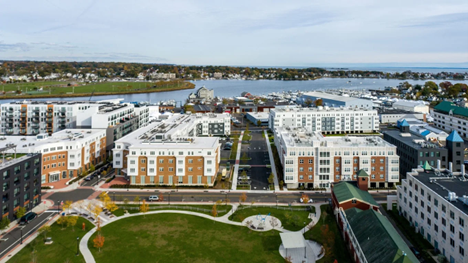
Research Focus
Climate change is an escalating crisis that disproportionately affects marginalized communities, exacerbating social inequities. In the United States, federally subsidized affordable housing—which has been shaped by historical segregation and discriminatory policies—is often situated in low-resource areas that are increasingly vulnerable to climate change impacts. This leads to significant health challenges for residents, including heat-related illnesses, respiratory and waterborne diseases, and mental health issues. To address these concerns, the US Department of Housing and Urban Development (HUD) have incorporated climate resiliency strategies in their affordable housing programs. Although some of these strategies are acknowledged for their long-term environmental benefits, there is a critical gap in research on their direct effects on neighborhoods and residents’ health and well-being, particularly in the short term.
This project aims to develop a comprehensive geospatial database using Geographic Information Systems (GIS) to map social vulnerability, health, and climate-related risks across federally subsidized-housing programs. This will be achieved by leveraging secondary data from various sources, including federally subsidized housing data from the National Housing Preservation Database (NHPD), demographic data from the U.S. Census Bureau’s American Community Survey (2023), climate risk data from the U.S. Environmental Protection Agency’s EJScreen portal, and health behavior and outcome data from the Centers for Disease Control and Prevention’s PLACES project (2024).
The database will serve as a resource within an evidence-based toolkit, providing visual insights for prioritizing mitigation and adaptation strategies identified in a rapid systematic review, and for understanding the specific climate risks faced by each subsidized housing site. We will conduct GIS spatial analysis to:
a) Identify climate vulnerability hotspots by mapping the intersection of climate hazards and vulnerable populations, and
b) Evaluate the relationship between climate vulnerability hotspots and specific socioeconomic factors, housing conditions, and environmental exposures. This analysis will provide insights into why certain communities are more at risk, thereby informing the prioritization of targeted interventions.
Skills, Techniques, Methods
- Data Manipulation, Management, and Analysis using R/Python.
- Spatial Mapping using ArcGIS/QGIS/R/Python.
- Dashboard Development using ArcGIS/R/Python.
Research Conditions
Students can expect a dynamic, collaborative research environment over the summer, working with an interdisciplinary team of experts in public policy, urban planning, and public health. Regular virtual and in-person meetings at the School of Public Health with Dr. Reis and the research group will be available. A flexible hybrid setup offers a comprehensive learning experience in mixed-method research and scientific communication. This setup supports skill development in technical analysis, professional collaboration, and community partner engagement, ensuring a well-rounded research experience.
Team Structure and Opportunities
The People Health and Place Unit (PHP) is led by Dr. Reis and comprises 2 post-docs, 3 PhD students, a project manager, and an international consultant. The team is transdisciplinary and collaborates with international experts from various fields. This structure promotes a rich learning environment and diverse perspectives. The student will work closely with team members through meetings and mentorship, gaining exposure to various research methodologies and collaborative strategies. As the student gains experience, opportunities for independent research will emerge, allowing them to explore their research interests within the project’s framework while receiving ongoing support and guidance.
Requirements
- Relevant coursework in GIS, environmental health, and data science.
- Knowledge of quantitative methods.
- Strong written and verbal communication skills.
- Ability to work independently and as part of a team.
- Proactivity and a willingness to engage in new learning experiences.

Rodrigo Reis
reis.rodrigo@wustl.edu